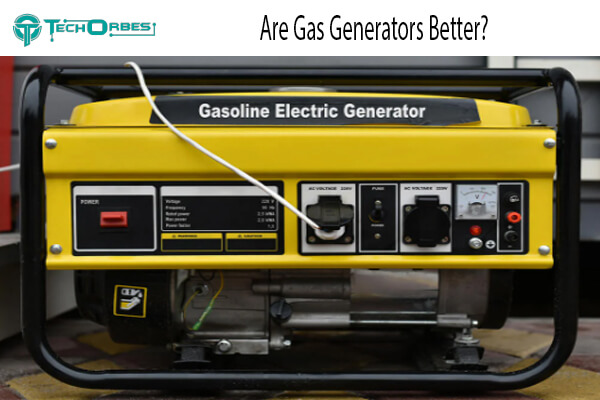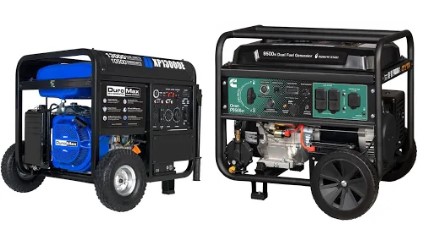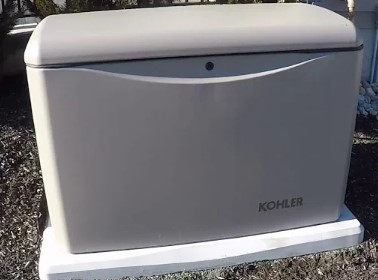Are Gas Generators Better? Quick Answer
A generator is essential to sustaining productivity at your job site, whether you require it as a primary or standby power source. Also, consider purchasing numerous generators to always have a backup and maintain business operations during an outage. But the question arises Are Gas Generators Better?
No, gas and diesel generators are the two most popular types. Each type is ideal for various conditions and purposes and has several advantages and disadvantages. Find out more about the benefits and drawbacks of these two generator types to decide which best meets your need.
Table of Contents
Are Gas Generators Better?
Gas generators are renowned for being portable and affordable. These generators are often smaller for more accessible transportation and run on cheaper gas. Gas generators are used for short-term purposes like power outages and are very efficient.

What Is A Gas Generator?
Using a natural gas generator is an effective way to generate electricity. It is regarded as one of the least expensive and most suitable fuel types among the fossil fuel family for producing electricity. It can be used to power emergency and portable generators.
Coal is the only fuel that is less expensive in terms of cost. The fact that coal is a highly polluting fuel source is one of the significant disadvantages of using it.
Drilling is frequently used to obtain natural gas, much like it is for oil. Several storage facilities transform natural gas from liquid form into gas. Following then, it is made accessible via pipes and can also be bought in cylinders.
A natural gas generator functions similarly to other generators in most respects. The fuel used to power each generator is typically the only difference between them. In this case, natural gas is used as the fuel source to start the generator. These generators are typically employed in big cities with a pipeline fuel distribution system for fuel supplies.
Advantages Of Using Natural Gas
- The benefits of using natural gas include that it is a cleaner kind of energy, is less expensive than other fossil fuels, and has a high-efficiency level.
- The levels of sulfur, nitrogen, and carbon dioxide (greenhouse gas) in natural gas are significantly lower than in oil and coal. One of the cleanest fossil fuels to use is natural gas.
- Unlike generators driven by diesel or oil, those powered by natural gas don’t emit a pungent smell.
- Although utility company electricity is frequently more expensive, using natural gas generators to power homes can significantly save expenditures.
- Natural gas is advantageous in big cities since it is transported directly through underground pipelines to the source where it is needed, in addition to burning cleaner and costing less to purchase. This makes fuel storage tanks unnecessary when using generators that are driven by natural gas.
Disadvantages Of Gas Generators
- Components like the carburetor may break down and need to be replaced.
- Not as efficient as gasoline
- Utilize gasoline, which lasts less time.
Types Of Gas Generators
Gas generators come in various sizes and designs depending on their intended use. The following are the most typical types:
Gas Powered Portable Generators
These are portable and compact, as you might expect. Since putting a more significant generator in your home would be expensive, portable generators are fantastic. The most excellent portable generators, typically dual-fuel, can run on gas and liquid fuel.
This is due to the difficulty in constantly locating a natural gas supply prepared to be connected to the apparatus. Connecting a portable generator to liquid gasoline is more practical and straightforward. Portable generators can only run a limited number of appliances simultaneously due to their size. As a result, they are better suited for usage in an emergency.

You might not require a specialized home backup power supply if you reside in a region with infrequent power outages. In this situation, portable generators are ideal because they are less expensive and handy if your electricity goes out. Another benefit of their portability is that you can carry them if necessary.
Standby Gas Generators
This is what you typically picture when you think of a gas generator. It links to subsurface pipelines that supply gas. As the name implies, you should only use this as a standby home backup power source during power outages. When the power goes out, these devices begin operating automatically. It doesn’t need to be manually powered.

These devices cannot function as a home backup for a very long period. The generator can break down if you leave it running for too long. See the manufacturer’s instruction booklet to determine how long it can be used safely. Follow the suggested run time. There are standby generators available for both home and business use.
Prime Gas Generators
Of the three categories, these are the least typical. These generators are designed to be used in locations without access to electrical power. Prime gas machines can operate for a long without problems because they were designed for such environments. The primary characteristic that distinguishes them from the standby ones is this.

In addition to having substantially longer runtimes, prime generators can support heavier loads. Therefore, they can produce a lot more electricity and run many more appliances. They function flawlessly and continually. Prime gas ones are typically solely utilized for business. Residential use could be more cost-effective.
How To Choose A Gas Generator Size?
For residences of various sizes, gas generators come in various sizes, not to be confused with propane generators. It would help to consider what equipment would be used to power while deciding on the appropriate size.

Understandably, larger homes will have more appliances, lighting, and air conditioning than smaller dwellings. And to power the entire house with the former, you will need generators with a bigger capacity. The typical devices and supplies typically connected to a generator are:
- Air conditioners
- Televisions
- Fridge and refrigerator
- Washing machine and dryer
- Space heater
- Electric water heater
- Thermostat
- Fans
- Electric oven and microwave
- Light bulbs
- Coffee maker
- Personal computers
- Home security system
- Power outlets (for chargers)
Finding The Capacity
Think about the appliances you want to connect to and how many of each you want to connect. Next, estimate how many kilowatts are required to power each device. You can discover the kilowatts of power needed in a particular item’s instruction manual.
For this calculation, it is essential to enlist an electrician’s assistance. Keep in mind that you must take into account both the running and surge wattages. The former is the amount of power required to keep an appliance running. The latter refers to the power consumption of a device when it is turned on.
When turned on, some appliances use more energy. In this situation, you should count its surge rather than running watts. Another aspect to consider is the number of circuits you wish to be powered up. Typically, the manufacturer specifies the number of circuits that a particular model can power.
Search for other models from the same manufacturer if the one you are considering doesn’t fit your requirements. After you know the kilowattage needed to power your necessary appliances, you can calculate the necessary amps by dividing wattage by voltage.
Purchase a generator that has a minimum output equal to the available capacity. If you plan to add more appliances for safety reasons, you can increase the load a little.
Conclusion
How can you determine whether Are Gas Generators Better? These power sources are generally ideal for all long-term home backup applications. Yet there are better options for places prone to earthquakes. This is so the generator won’t be rendered useless by damaged underground gas pipelines brought on by earthquakes. I hope you found this post to be helpful till we speak again!
Frequently Asked Questions
What are the disadvantages of gas generators?
Natural gas generators also have the modest disadvantage of being slightly riskier than other energy generators. Since natural gas is highly combustible, there may be an explosion or fire if leaks are discovered.
Which is better, a gas or an electric generator?
Gas generators win here over portable stations. They have a lot of energy storage capacity but need help matching the gas generator capacity. Gas generators can generate up to twice as much electricity as portable stations.
Are gas generators worth it?
Generally speaking, purchasing a standby generator provides more advantages. A home backup generator’s benefits are improved convenience, efficiency, and safety. If you own a home and frequently go away for several hours at a period, it also saves you money over time.
Which is better, a gas or inverter generator?
Compared to fuel-driven generators, inverter generators are significantly more fuel-efficient. Unlike traditional generators, which run at a fixed speed, an inverter generator automatically changes the engine speed to match the demands of the load.

Rayssa is a native American. A group of specialized individuals raised her with a passion for gaming. Here she discovered that computer games can expand your creative mind to infinite possibilities. In recent years, she has gone beyond gaming as a means of entertainment to enjoy it as a passio
